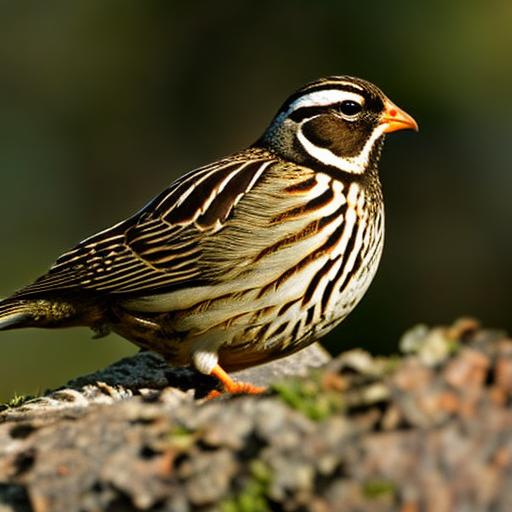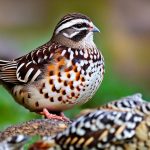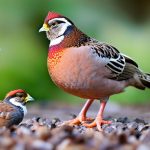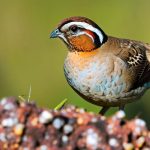Quail are small, ground-dwelling birds that belong to the pheasant family. They are known for their distinctive plump bodies, short tails, and round wings. Quail are popular among bird enthusiasts and farmers alike due to their small size, low maintenance, and high egg production. They are also known for their delicious meat, making them a popular choice for backyard farming and homesteading.
Quail are social birds that thrive in small flocks, making them an ideal choice for those looking to raise birds in a limited space. They are also relatively quiet compared to other poultry, making them suitable for urban or suburban settings. Quail are hardy birds that can adapt to a wide range of climates, making them an excellent choice for beginners and experienced bird keepers alike.
Quail are known for their gentle and docile nature, making them easy to handle and care for. They are also known for their curious and active behavior, often foraging for food and exploring their surroundings. Quail are omnivorous birds, feeding on a diet of seeds, insects, and small plants. They are also known for their high egg production, with some breeds laying up to 300 eggs per year. Overall, quail are fascinating birds that offer a range of benefits to those looking to raise them.
Key Takeaways
- Quail are small, ground-dwelling birds that are known for their gentle nature and ability to lay eggs.
- When choosing a quail breed, consider factors such as egg production, temperament, and space requirements.
- A quail habitat should include a secure enclosure, nesting boxes, and access to fresh water and a balanced diet.
- Quail require a diet high in protein and calcium, as well as regular cleaning and monitoring for signs of illness.
- Health and safety considerations for quail include protecting them from predators and providing a clean and stress-free environment.
Choosing the Right Quail Breed:
When it comes to choosing the right quail breed, there are several factors to consider, including egg production, meat quality, temperament, and climate adaptability. Some popular quail breeds include the Coturnix quail, Bobwhite quail, and California quail, each with its own unique characteristics and benefits.
The Coturnix quail, also known as the Japanese quail, is one of the most popular breeds for backyard farming due to its high egg production and fast growth rate. They are also known for their gentle nature and adaptability to various climates, making them an ideal choice for beginners. The Bobwhite quail is another popular breed known for its delicious meat and beautiful plumage. They are also known for their strong flying abilities, making them a popular choice for hunting enthusiasts.
The California quail is a popular choice for those living in the western United States, known for its striking appearance and adaptability to arid climates. When choosing a quail breed, it’s important to consider your specific needs and goals for raising quail. Whether you’re looking for high egg production, delicious meat, or a beautiful addition to your backyard flock, there’s a quail breed that’s right for you.
Setting Up a Quail Habitat:
Setting up a suitable habitat is essential for the health and well-being of your quail. Whether you’re raising quail for eggs, meat, or as pets, providing a comfortable and secure environment is crucial. Quail can be raised in a variety of housing options, including cages, aviaries, or outdoor pens. When designing a quail habitat, it’s important to consider factors such as space requirements, ventilation, temperature control, and predator protection.
For indoor housing, wire cages with solid floors are a popular choice for raising quail. These cages provide good ventilation and make it easy to clean up droppings. It’s important to provide at least 1 square foot of space per bird to ensure they have enough room to move around comfortably. Outdoor pens or aviaries can also be used to raise quail, providing them with access to natural sunlight and fresh air. It’s important to provide shelter from the elements and protection from predators when raising quail outdoors.
In addition to housing, it’s important to provide your quail with suitable bedding material, such as straw or wood shavings, to keep them comfortable and dry. Access to fresh water and a balanced diet are also essential for the health of your quail. Overall, creating a suitable habitat for your quail is essential for their well-being and productivity.
Feeding and Caring for Quail:
Feeding and caring for quail is relatively straightforward, but it’s important to provide them with a balanced diet and proper care to ensure their health and productivity. Quail are omnivorous birds that require a diet of high-quality commercial feed supplemented with fresh fruits, vegetables, and protein sources such as mealworms or crickets.
When feeding quail, it’s important to provide them with a high-protein feed specifically formulated for game birds or poultry. This will help support their growth and egg production. It’s also important to provide access to fresh water at all times to keep your quail hydrated and healthy.
In addition to feeding, it’s important to regularly clean your quail’s habitat to prevent the buildup of droppings and bacteria. This will help prevent disease and keep your quail healthy and comfortable. Regular health checks are also important to monitor the well-being of your quail and address any potential issues early on.
Quail are relatively low-maintenance birds but require regular care and attention to thrive. By providing them with a balanced diet, clean habitat, and proper care, you can ensure that your quail remain healthy and productive.
Health and Safety Considerations:
Maintaining the health and safety of your quail is essential for their well-being and productivity. There are several key considerations to keep in mind when it comes to keeping your quail healthy and safe from potential threats.
One of the most important aspects of maintaining quail health is disease prevention. It’s important to practice good biosecurity measures by keeping your quail’s habitat clean and free from potential disease vectors. Regularly cleaning their habitat, providing fresh water, and monitoring their health can help prevent the spread of disease among your flock.
Another important consideration is predator protection. Quail are vulnerable to predators such as raccoons, foxes, and birds of prey. It’s important to provide secure housing with strong wire mesh to prevent predators from gaining access to your quail. Additionally, providing shelter and hiding spots within their habitat can help your quail feel safe and secure.
Regular health checks are also important for monitoring the well-being of your quail. Keep an eye out for any signs of illness or injury and address any issues promptly. By taking proactive measures to maintain the health and safety of your quail, you can ensure that they remain happy, healthy, and productive.
Breeding and Raising Quail Chicks:
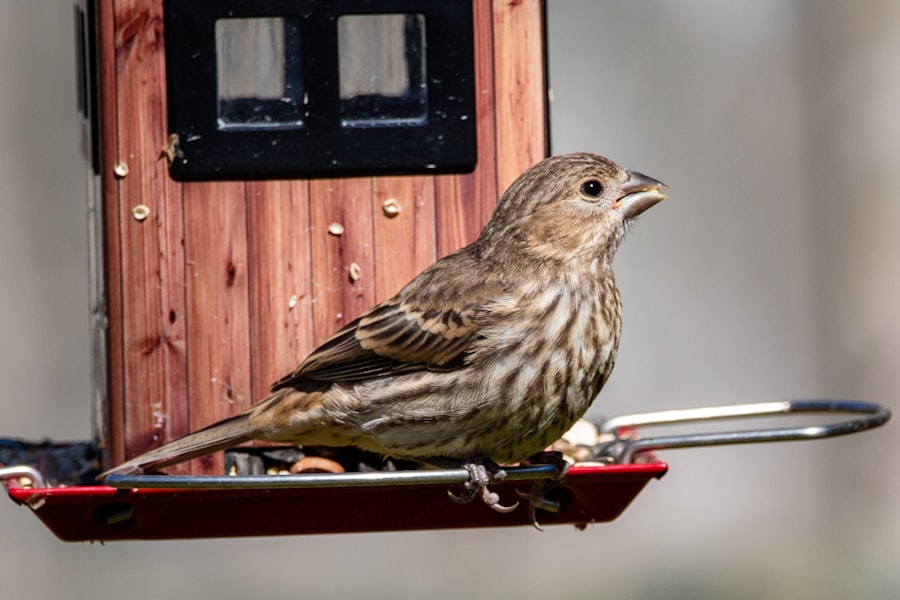
Breeding and raising quail chicks can be a rewarding experience for bird enthusiasts and farmers alike. Quail are prolific breeders that reach sexual maturity at around 6-8 weeks of age. When breeding quail, it’s important to provide them with a suitable nesting area with soft bedding material such as straw or wood shavings.
Quail eggs typically take around 17-18 days to hatch, with chicks being fully feathered and ready to leave the nest within a few weeks. It’s important to provide the chicks with a warm brooder area equipped with a heat lamp or heat pad to keep them warm during their early days.
When raising quail chicks, it’s important to provide them with a high-protein starter feed specifically formulated for young birds. It’s also important to provide them with access to fresh water at all times to keep them hydrated.
As the chicks grow, it’s important to gradually introduce them to their adult diet and provide them with suitable housing as they mature. By providing proper care and attention during the breeding and raising process, you can ensure that your quail chicks grow into healthy and productive adults.
Enjoying the Benefits of Keeping Quail:
Keeping quail offers a range of benefits for bird enthusiasts and farmers alike. Whether you’re raising quail for eggs, meat, or as pets, there are numerous advantages to keeping these fascinating birds.
One of the primary benefits of keeping quail is their high egg production. Some quail breeds can lay up to 300 eggs per year, providing a bountiful supply of nutritious eggs for your family or for sale. Quail eggs are also known for their rich flavor and high nutritional value, making them a popular choice among food enthusiasts.
Quail meat is another sought-after product of keeping quail. Known for its delicate flavor and tender texture, quail meat is prized by chefs and home cooks alike. Raising quail for meat provides a sustainable source of protein that can be enjoyed in a variety of culinary dishes.
In addition to eggs and meat, keeping quail can also be a rewarding hobby. Quail are fascinating birds that exhibit curious behavior and make delightful additions to backyard flocks. Their gentle nature and low maintenance requirements make them an ideal choice for those looking to raise birds without a significant time commitment.
Overall, keeping quail offers a range of benefits including high egg production, delicious meat, and the enjoyment of raising these charming birds. Whether you’re an experienced farmer or a beginner bird enthusiast, keeping quail can be a rewarding experience that provides numerous advantages for you and your family.
If you’re considering keeping quail in your backyard, you may also be interested in learning about the best location for your chicken coop. Poultry Wizard offers a helpful article on “Where to Put Your Chicken Coop,” which provides valuable insights into creating an ideal environment for your feathered friends. Check out the article here to ensure that your quail and other poultry have a comfortable and safe living space.
FAQs
What are the benefits of keeping quail in the backyard?
Quail are relatively low maintenance and can provide a sustainable source of eggs and meat for the household. They also help control pests in the garden and their droppings can be used as fertilizer.
What do quail need in their backyard habitat?
Quail need a secure and predator-proof enclosure, access to fresh water, a balanced diet of commercial quail feed and occasional treats, and a clean and dry living space.
How many quail can be kept in a backyard?
The number of quail that can be kept in a backyard depends on the size of the enclosure and the local regulations. Generally, a small flock of 4-6 quail can be comfortably kept in a backyard.
Are there any legal restrictions on keeping quail in a backyard?
Local regulations regarding the keeping of quail in a backyard vary, so it is important to check with the local authorities before starting a quail keeping project.
What are the common health issues for backyard quail?
Common health issues for backyard quail include respiratory infections, parasites, and injuries. It is important to monitor the quail regularly and seek veterinary care if any health issues arise.
Can quail be kept with other backyard animals?
Quail can be kept with other backyard animals such as chickens, as long as they have enough space and are introduced to each other gradually. It is important to monitor their interactions to ensure the safety of all animals.
Meet Walter, the feathered-friend fanatic of Florida! Nestled in the sunshine state, Walter struts through life with his feathered companions, clucking his way to happiness. With a coop that’s fancier than a five-star hotel, he’s the Don Juan of the chicken world. When he’s not teaching his hens to do the cha-cha, you’ll find him in a heated debate with his prized rooster, Sir Clucks-a-Lot. Walter’s poultry passion is no yolk; he’s the sunny-side-up guy you never knew you needed in your flock of friends!

